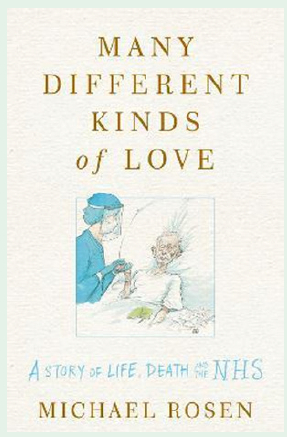Services on Demand
Article
Indicators
Related links
-
 Cited by Google
Cited by Google -
 Similars in Google
Similars in Google
Share
South African Journal of Occupational Therapy
On-line version ISSN 2310-3833
Print version ISSN 0038-2337
S. Afr. j. occup. ther. vol.52 n.2 Pretoria Aug. 2022
http://dx.doi.org/10.17159/2310-3833/2022/vol52n2a9
BOOK REVIEW
Many different kinds of love: A story of life, death and the NHS by Michael Rosen
Elma Burger
Netcare Rehab Hospital, Auckland Park, Johannesburg, South Africa http://orcid.org/0000-0003-1062-5576
AUTHOR: Michael Wayne Rosen
Publisher by: Ebury Press, London
ISBN: 9781529109450
Available in: Paperback and hardcopy
Price in Rand: (ZAR) R214.00
Number of pages: 270

Information on the author
Michael Wayne Rosen, born 1946, is a British children's author and poet. From 2007 to 2009, he served as a Children's Laureate to promote and encourage children's interest in literature and reading. He has been a television presenter and political columnist. He is a prolific writer and has written 140 books. In 2008 he wrote the poem These are the hands, to celebrate the 60th anniversary of the NHS. This poem became an unofficial anthem for health-workers coping with the first wave of the pandemic. His personal website https://www.michaelrosen.co.uk/ focuses on getting children to read and write. He contracted Covid 19 in March 2020.
The Review
The National Health Service (NHS) is the publicly funded healthcare system in England. It is the second largest single-payer healthcare system in the world and employs thousands of health workers, including occupational therapists. It came about shortly after the second world war in the late 1940s and is based on the ideal that health care should be made available to all. This ideal, supported by the World Health Organisation's universal health coverage, includes the full range of essential health services, from health promotion to prevention, treatment, rehabilitation, and palliative care.
The book describes the author's journey from first being diagnosed with Covid and his subsequent admission into hospital, battling the illness and his long road to recovery or, as Mr Rosen puts it, "continuous recovery". He told the Guardian newspaper in March 2021 that: "This book is about what it feels like to nearly die". He also described the lasting battles he still has with the disease.
The author begins by describing the battle to access health care due to the extreme pressure on the NHS during the peak of the virus. He then describes the circumstances that led to his admission into hospital and eventually being placed in an induced coma. He divides his road to recovery into a post-coma phase, his journey in the rehabilitation hospital and a discharge phase. The long-lasting impact of Covid, residual impairments and the health interventions to overcome those, are discussed in the last part of the book.
There is scant reference to occupation therapy and the impact of occupational therapy in this book. However, it takes the reader on an incredible journey of contracting and recovering from Covid 19 from the patient's perspective. The book really resonated with me and necessitated a second reading to absorb everything. One is forced to appreciate his work for what it is - a beautifully written book describing the impact of a horrible disease interwoven with lovely poetry, and the incredible gratitude and appreciation the author has for health workers. It is one of the first books of its kind and will allow occupational therapists to apply such to their everyday healthcare and therapy.
The author describes the feeling of being unable to get enough air and of not being able to "catch up". One can sense his anxiety through the words: "now everything is uncertain", "I have become an account - they record all my vitals carefully", and "Energy is sacred". He also experienced a great sense of loss for the 47 days in ICU, days of which he has no memory. Various health workers and therapists were brought in to assist with basic nursing in ICU. Some of them had written daily messages of events of each day and he found great comfort in reading this personal diary the health workers had kept for him, it lessened the loss of the 47 days.
He expressed the great sense of shame and guilt of not being able to control his bodily functions, especially as it caused extra unpleasant work for the already over-burdened health workers. The professional and sensitive way in which the nurses approached such tasks appeased his discomfort and guilt. He missed contact with his family and Facetime became an absolute saviour as at least he could see his family and friends whilst talking to them. Small seemingly insignificant gestures, such as having a blanket from home, made him feel safe and that, in some way, his wife was with him.
Eventually he is transferred to a rehabilitation hospital, which he saw "as a way out". However, his weakness and inability to carry out simple tasks was devastating, trying to make his leg move made him feel as though he was asking a blank space to move. He observed that in a rehabilitation hospital: ".. we get on with each other only because we have bits wrong with us". Eventually he regained sufficient function to go home after nearly three months in hospital. At the time of printing, Rosen was still battling with residual impairments such as loss of sight and hearing in one eye and ear, memory loss and changes in skin sensation.
This book is strongly recommended for occupational therapists, it opens one's eyes to the impact of Covid 19 on patients. The author's poetic writing style might not be to everyone's liking as much of what is written is left to the reader's interpretation. One statement made a huge impression on me and will necessitate further consideration for years to come: "The Occupational Therapist taught me how to own my frailty. I had to choose "to do the work or give up".














